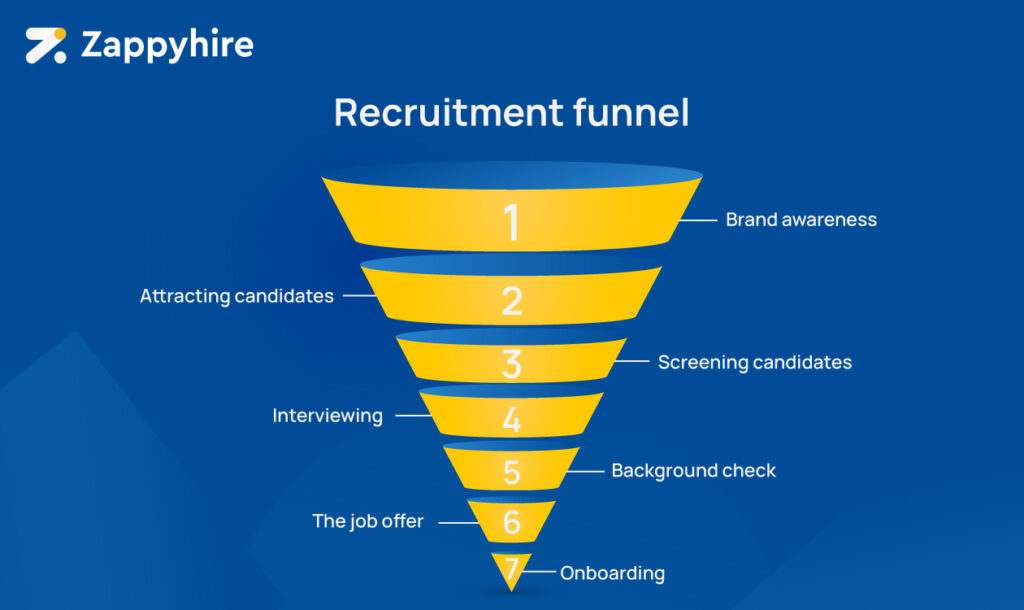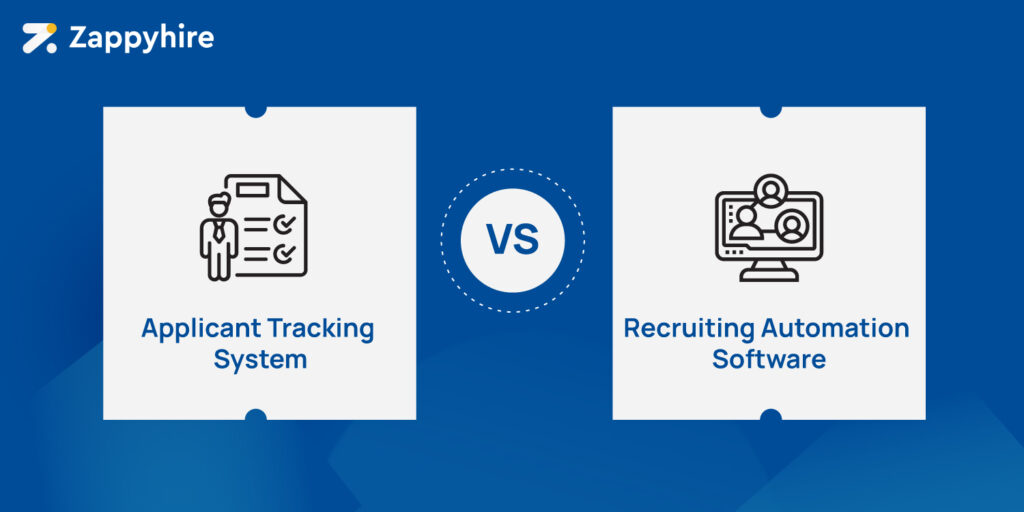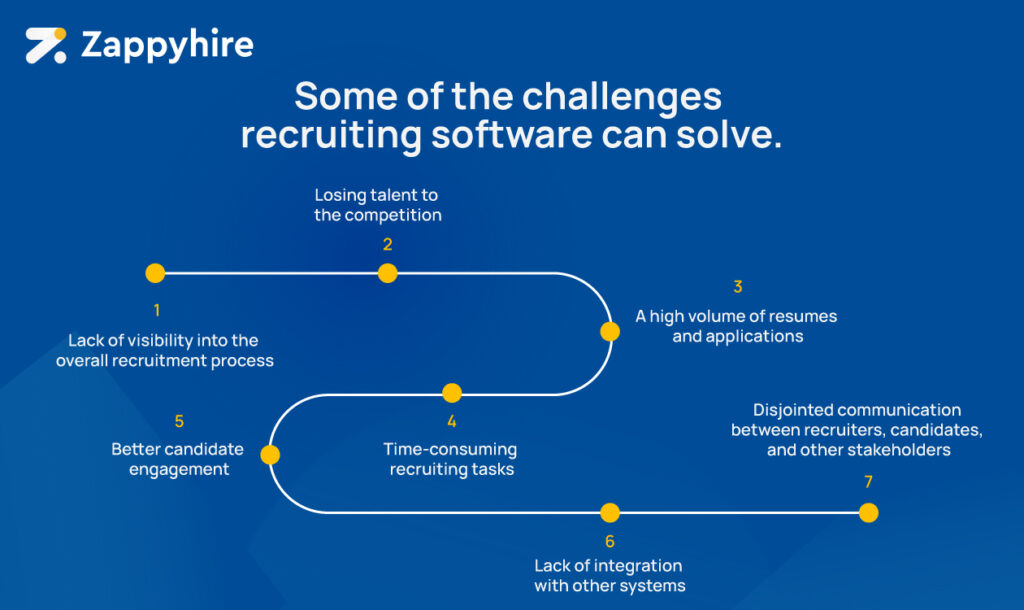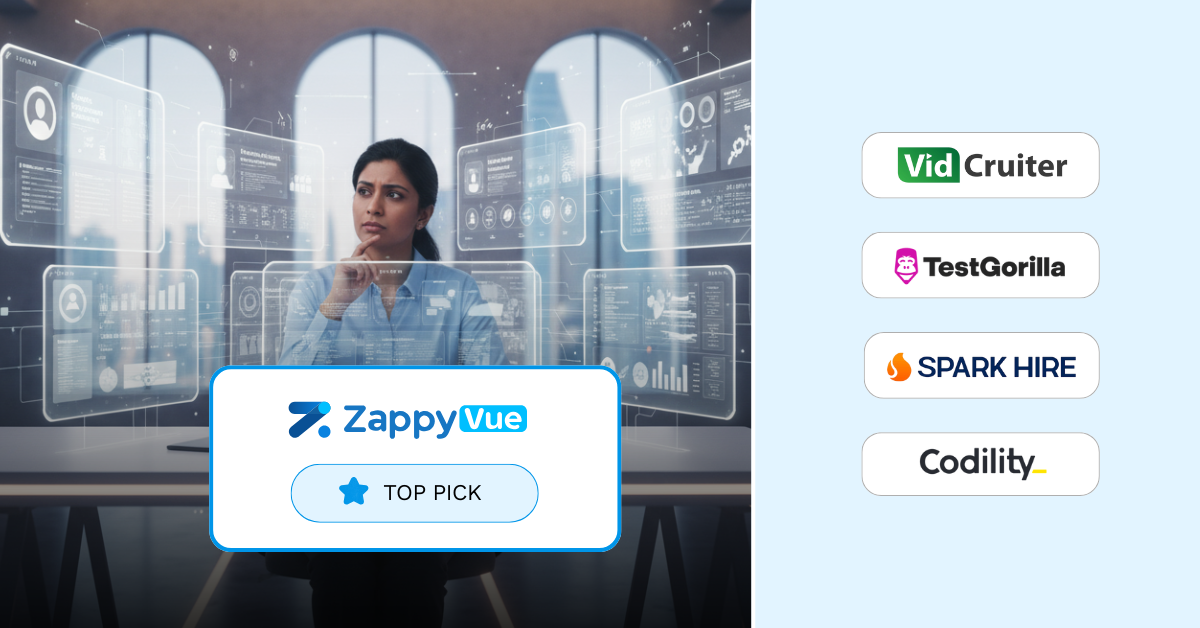
🗘 Blog updated on 27 Jan, 2026
If you’re in the business of talent acquisition, you know that the recruitment process can be time-consuming and overwhelming. With so many resumes to sift through, candidates to assess, engage, and keep the rest of the stakeholders updated, it’s easy to get lost in the details. That’s where recruiting software comes in.
What is a Recruiting Software?
Recruiting software is a tech platform designed to help organizations plan, execute, and optimize their hiring process end to end.
Modern recruiting software goes beyond tracking applicants as it automates resume screening, interview coordination, evaluations, and shortlisting while providing real-time visibility into hiring performance.
Today’s recruiting platforms combine automation, AI, and structured workflows to reduce manual effort across the interview funnel. They help hiring teams evaluate candidates consistently, scale hiring across roles and locations, and make faster, data-backed hiring decisions—all while improving the candidate experience.

Who Uses Recruiting Software?
HR & Talent Acquisition Teams
HR and TA teams use recruiting software to manage high volumes hiring, standardize evaluations, reduce time-to-hire, and maintain compliance across hiring processes.
Recruiters & Hiring Managers
Recruiters and hiring managers rely on recruiting platforms to screen candidates efficiently, collaborate on evaluations, and reduce time spent on coordination, scheduling, and follow-ups.
CHROs & TA Leaders
Leadership teams use recruiting software to gain visibility into hiring performance, identify bottlenecks in the interview funnel, and ensure hiring processes scale without compromising quality or fairness.
Mid-Market & Enterprise Organizations
Organizations hiring at scale – across campuses, lateral roles, or distributed teams – use recruiting software to handle large applicant volumes, ensure consistency, and support faster decision-making.
7 Awesome Benefits of Using Recruitment Software
Reduced Recruiter Effort
Recruiting software significantly reduces the manual workload on recruiters by automating screening, interview scheduling, evaluations, and shortlisting.
Faster Shortlisting
AI-driven evaluations and predefined criteria help hiring teams shortlist candidates quickly and consistently, even at scale.
Consistent, Bias-Aware Evaluations
Structured workflows and standardized AI assessments ensure candidates are evaluated objectively and fairly across roles and interviewers.
Scalable Hiring
Recruiting software enables teams to handle spikes in applications without increasing recruiter headcount, making it ideal for high-volume hiring.
Better Candidate Experience
AI-powered video interviews, self-scheduling, and timely updates create a smoother and more flexible experience for candidates.
Data-Driven Hiring Decisions
Recruiting platforms provide actionable insights into hiring metrics such as drop-offs, turnaround times, and funnel efficiency.

Recruiting Software Vs ATS (Applicant Tracking System) – What is the Difference?
While recruiting software and applicant tracking systems (ATS) are similar in that they both help with the hiring process, there are some key differences.

An Applicant Tracking System (ATS) primarily serves as a system of record. It stores candidate data, applications, and hiring status.
Recruiting software, on the other hand, focuses on executing and optimizing the interview funnel. It automates screening, evaluations, scheduling, and decision-making steps that traditionally happen outside the ATS.
In modern hiring stacks, recruiting software often works alongside or on top of an ATS, extending its capabilities with automation, intelligence, and workflow optimization rather than replacing it.
Types of Recruiting Software
Applicant Tracking Systems (ATS)
ATS platforms help organizations track candidates, manage job applications, and maintain hiring records across roles and teams.
Candidate Relationship Management (CRM) Software
Recruitment CRMs enable organizations to engage and nurture talent pools over time through structured communication and outreach.
AI Video Interviewing Software
AI video interviewing platforms support asynchronous interviews, automated evaluations, and standardized screening at scale. They reduce scheduling dependency, minimize no-shows, and help hiring teams assess candidates faster and more consistently.
Candidate Sourcing Software
These tools help organizations identify and attract candidates from job boards, social platforms, and talent databases using automation and AI-driven matching.
Global Recruiting Software Market Size & Forecast
The global recruitment software market is experiencing steady growth, driven by the rapid adoption of cloud-based and AI-powered hiring technologies.
Valued at approximately USD 2.4–2.8 billion in 2024, the market is expected to reach USD 6+ billion by 2032–2033, growing at a mid-to-high single-digit CAGR over the forecast period.
Increasing hiring volumes, remote and distributed workforces, and enterprise demand for automation, data-driven screening, and improved candidate experience are key growth drivers.
Innovations & Current Trends in Recruiting Software
AI-Led Screening & Shortlisting
Modern recruiting software uses AI to evaluate candidates based on predefined criteria, reducing manual resume reviews and speeding up shortlisting.
Asynchronous Interviews
One-way and on-demand video interviews have become a standard approach for early-stage screening, offering flexibility for both candidates and hiring teams.
Interview Funnel Automation
From application to shortlisting, agentic AI-powered recruiting platforms automate multiple stages of the interview funnel, minimizing handoffs and delays.
Predictive Hiring Insights
Recruiting software increasingly provides insights into hiring patterns, bottlenecks, and outcomes to support better decision-making.
AI-powered Report Generation
Recruiting platforms are moving away from static dashboards toward conversational reporting experiences, inspired by LLM interfaces like ChatGPT and Claude.
Instead of digging through filters and charts, recruiters can ask natural-language questions and instantly get insights on funnel performance, drop-offs, interviewer efficiency, and hiring outcomes making data far more accessible and actionable for hiring teams.
💡 Fun Fact – Zappyhire has the easy report finder feature you just read about! Book a demo to see it in action!
What are the Challenges Recruiting Software Solve?

Lack of Visibility into the Overall Recruitment Process
When hiring data is scattered across tools and spreadsheets, teams lose track of candidate movement, bottlenecks, and hiring velocity.
Modern AI recruiting platforms provide real-time dashboards, stage-wise insights, and funnel analytics giving hiring teams a clear view of what’s moving, what’s stuck, and what needs attention. This enables faster decisions, better forecasting, and tighter control over the hiring process.

Losing Talent to the Competition
In competitive talent markets, delays cost hires. AI recruiting software helps teams move faster by identifying high-intent, high-fit candidates early using data-driven screening and prioritization.
Companies can engage top candidates before they drop off or accept competing offers by reducing time lost in manual shortlisting and coordination.
A High Volume of Resumes and Applications
High application volumes often overwhelm recruiters and slow down hiring. AI-powered screening automates resume analysis, skill matching, and eligibility checks at scale, shortlisting only the most relevant candidates based on predefined criteria.
This ensures quality isn’t lost even when volume spikes.
Time-consuming Recruiting Tasks
Interview scheduling, follow-ups, status updates, and coordination consume a disproportionate amount of recruiter time.
AI recruiting software automates these repetitive workflows, freeing recruiters to focus on candidate evaluation, stakeholder alignment, and hiring strategy rather than administrative work.
Better Candidate Engagement
Today’s candidates expect speed, clarity, and flexibility. With features like automated communication, self-service interview scheduling, and asynchronous interviews, AI recruiting software ensures candidates stay informed and engaged without manual intervention, leading to lower drop-offs and higher offer acceptance rates.
Lack of Integration with Other Systems
Disconnected tools create data silos and manual handoffs. AI recruiting software integrates seamlessly with ATS, HRMS, assessment tools, and communication platforms ensuring a single source of truth across the hiring lifecycle and smoother collaboration between teams.
Disjointed communication between recruiters, candidates, and other stakeholders
Hiring breaks down when communication is fragmented. A centralized recruitment platform brings all conversations, feedback, interview notes, and decisions into one place—improving transparency,

The Key Considerations When Choosing a Recruiting Software
Machine Learning and AI (Artificial Intelligence)
One of the key considerations when choosing recruiting software is whether it uses machine learning and artificial intelligence (AI) to help automate the recruitment process. AI-based recruiting software can help to quickly identify the most qualified candidates, reduce bias in the recruitment process, and automate time-consuming tasks such as scheduling interviews and sending follow-up emails.
Automation Across the Interview Funnel
Look for platforms that automate screening, scheduling, evaluations, and shortlisting—not just applicant tracking.
AI Capabilities with Transparency
Ensure AI-driven features are explainable, configurable, and aligned with fair hiring practices.
Scalability
The software should handle both current and future hiring volumes without adding operational complexity.
Integration with Existing Systems
Seamless integration with ATS, HRMS, and assessment tools is essential for efficient workflows.
Analytics & Reporting
Choose platforms that provide actionable insights into hiring performance and bottlenecks.
Data Security & Compliance
Recruiting software must meet enterprise-grade security standards and protect sensitive candidate data.
How Much Does Recruiting Software Cost?
Recruiting software pricing varies based on features, scale, and usage. Common pricing models include:
- Subscription-based pricing
- Usage-based pricing (e.g., per interviews, credits, workflows)
- Enterprise pricing customized to hiring volume and integrations
- Modular pricing, allowing teams to pay only for required features
Organizations should evaluate pricing in relation to time saved, efficiency gains, and hiring outcomes rather than cost alone.






